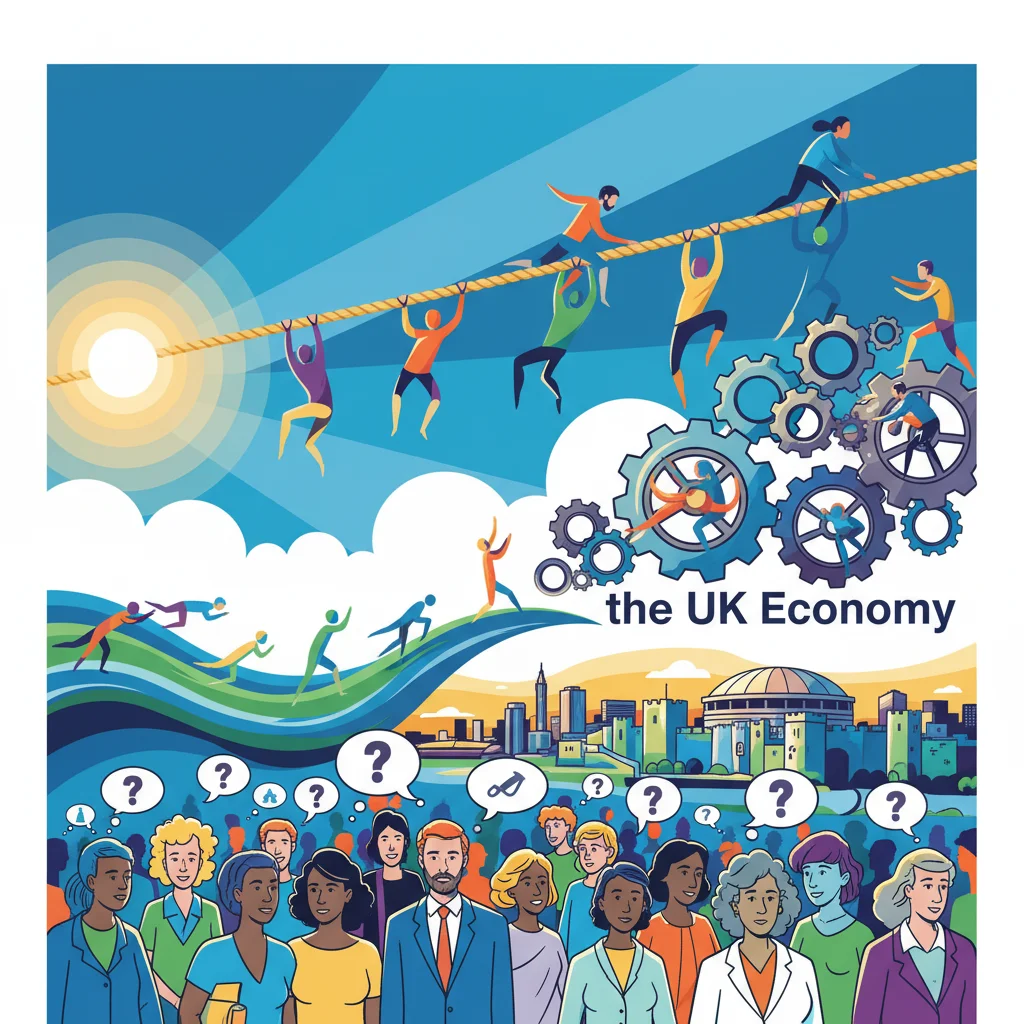
The New Minimum Wage: A Lifeline for Workers or a Tightrope for the UK Economy?
The Human Reaction to an Economic Equation
In the bustling streets of Cardiff, a simple question posed by the BBC about the UK’s recent minimum wage increase elicited a surprising and telling response: “I didn’t expect that.” This reaction from young workers encapsulates a nationwide sentiment—a mixture of relief, surprise, and underlying uncertainty. On April 1, 2024, the UK government implemented one of the most significant increases to the National Living Wage (NLW) in its history. For millions, this represents a tangible boost in their take-home pay, a crucial buffer against the persistent cost of living crisis. However, for business leaders, investors, and economists, this pay rise is not just a line item on a payslip; it’s a major variable in the complex algorithm of the national economy.
This policy change forces us to look beyond the headlines and ask critical questions. Is this wage hike a sustainable tool for social equity, or will it trigger unintended consequences for inflation and employment? How will this ripple through the stock market, impacting sectors from retail to hospitality? And in an era of rapid digital transformation, what role can financial technology play in helping both individuals and businesses navigate this new financial landscape? This article delves into the multifaceted implications of the UK’s new minimum wage, examining its impact on personal finance, corporate strategy, and the broader economic framework.
Decoding the Numbers: A Closer Look at the 2024 Wage Increase
To understand the full scope of this policy, it’s essential to examine the specific changes. The centerpiece is the increase in the National Living Wage—the statutory minimum for workers aged 21 and over—which saw a 9.8% rise. This move is part of a long-term government ambition to eradicate low pay. Furthermore, the rates for younger workers and apprentices also received substantial boosts, signaling a comprehensive effort to lift wages across the board.
Here is a breakdown of the new hourly rates effective from April 2024, as outlined by the UK government:
| Age Group / Category | New Hourly Rate (from April 2024) | Previous Hourly Rate | Percentage Increase |
|---|---|---|---|
| National Living Wage (21 and over) | £11.44 | £10.42 (for 23+) | 9.8% |
| 18-20 Year Old Rate | £8.60 | £7.49 | 14.8% |
| 16-17 Year Old Rate | £6.40 | £5.28 | 21.2% |
| Apprentice Rate | £6.40 | £5.28 | 21.2% |
This increase is not happening in a vacuum. It comes at a time when the UK has been grappling with inflation levels not seen in decades. While inflation has been cooling, it remains a primary concern for the Bank of England and a daily reality for households. The Low Pay Commission, the independent body that recommends these rates, must perform a delicate balancing act: ensuring the wage provides a decent standard of living without placing an unsustainable burden on businesses that could fuel further price hikes—a classic challenge in modern economics.
The Nvidia Paradox: Why AI Supremacy is a Double-Edged Sword for Investors
The Economic Debate: A Boost for Spending or a Burden on Business?
The implementation of a higher minimum wage is one of the most debated topics in economics, with compelling arguments on both sides.
The Case for a Higher Wage Floor
Proponents argue that increasing the minimum wage is a direct and effective way to combat in-work poverty and reduce inequality. With more disposable income, lower-paid workers are likely to spend it immediately on essential goods and services. This concept, known as a high marginal propensity to consume, can create a virtuous cycle, boosting aggregate demand and stimulating economic growth. For investors, this could translate to stronger performance in consumer-facing sectors. Companies selling everyday necessities may see a more resilient customer base, potentially stabilizing their position in the stock market.
The Concerns from the Business Community
Conversely, many business leaders, particularly in sectors with tight margins like hospitality, retail, and social care, voice significant concerns. For them, labor is often the largest operational cost. A mandated wage increase can lead to a difficult choice: absorb the cost and accept lower profits, pass the cost onto consumers through higher prices, or reduce labor costs through other means, such as cutting staff hours or slowing down hiring. The Federation of Small Businesses has frequently highlighted that while they support fair pay, abrupt and substantial increases can threaten the viability of smaller enterprises that lack the scale and pricing power of larger corporations. This pressure could, in a worst-case scenario, contribute to the “wage-price spiral” that central bankers dread, where higher wages lead to higher prices, which in turn lead to demands for even higher wages.
Ripple Effects: Implications for Investing and Financial Markets
A national policy change of this magnitude inevitably sends ripples across the financial markets. Sophisticated investors and finance professionals must analyze these effects to adjust their strategies. The impact is not uniform; it varies significantly by sector.
- Retail & Hospitality: These sectors are highly labor-intensive and will feel the impact most directly. Investors will be scrutinizing company earnings reports for any signs of margin compression. Companies that can leverage technology for efficiency or command strong brand loyalty may be better positioned to weather the storm.
- Consumer Goods: A key principle of investing is to follow the money. With millions of low-income workers seeing a pay rise, companies that produce consumer staples—food, beverages, household products—could experience a demand boost. This could make them a more defensive and attractive option in an uncertain economic climate.
- Banking and Lenders: The banking sector faces a dual impact. On one hand, higher wages could lead to improved household financial health, potentially reducing loan default rates. On the other, if the wage increase contributes to persistent inflation, the Bank of England may be forced to keep interest rates higher for longer, which can have complex effects on bank profitability and the cost of borrowing for the entire economy.
For those involved in active trading, this policy shift introduces new volatility and opportunities. The market’s reaction in the months following the wage hike will be a key indicator of investor confidence in the UK’s economic resilience.
The Summers-Epstein Nexus: A Sobering Lesson in Reputational Risk for Finance and Leadership
The Fintech Frontier: A Digital Safety Net?
While government policy sets the wage floor, the world of financial technology, or fintech, offers the tools to help individuals and businesses build upon it. The challenges posed by the new wage landscape can be partially mitigated by technological innovation.
For Individuals:
For an employee adjusting to a new income level, financial literacy is paramount. Fintech provides accessible tools that were once the preserve of the wealthy.
- Budgeting Apps: Platforms like Monzo, Revolut, and Starling Bank offer real-time spending analytics, helping users track where their extra income is going and build healthier financial habits.
- Micro-Investing: Services that allow users to invest small, regular amounts can help minimum wage earners start building long-term wealth, turning a portion of their pay rise into a future nest egg.
- Earned Wage Access (EWA): Some fintech firms offer solutions that allow employees to access a portion of their earned wages before the official payday, providing a crucial alternative to high-cost payday loans in an emergency. A report from EY highlights the growing importance of such tools for employee financial wellbeing.
For Businesses:
SMEs can leverage fintech to absorb rising labor costs more effectively. Automated payroll systems, advanced inventory management software, and efficient digital payment solutions can reduce administrative overhead and improve operational efficiency. Looking further ahead, some innovators are exploring how emerging technologies like blockchain could create more transparent and efficient payroll systems, especially for a workforce with a growing number of freelance and gig-economy participants.
Geopolitical Chess at COP30: How Brazil's Climate Diplomacy is Reshaping Global Finance
Conclusion: A Shared Responsibility
The UK’s minimum wage increase is far more than a simple pay adjustment. It is a bold social and economic experiment designed to improve the lives of the country’s lowest-paid workers. The initial shock and relief felt by young people in Cardiff are valid, but the long-term success of this policy hinges on a delicate balance. It requires businesses to innovate and enhance productivity, the government to foster a stable and supportive economic environment, and individuals to leverage the tools at their disposal—including the growing suite of fintech solutions—to manage their finances effectively.
For investors, business leaders, and financial professionals, the path forward demands vigilance and adaptability. The true test will be whether this wage increase acts as a springboard for broad-based economic strength or a weight that drags on growth and fuels inflation. The answer will shape the UK’s economic landscape for years to come.

